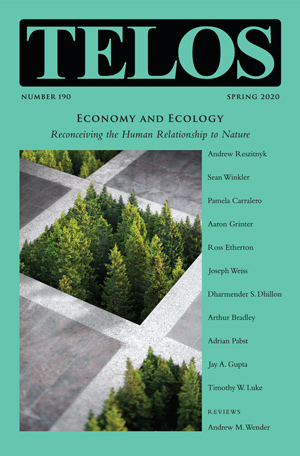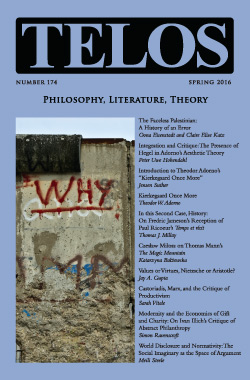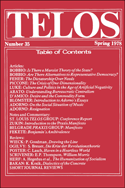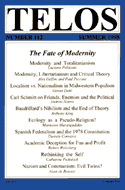By Telos Press · Monday, October 30, 2023  In sorrow, the Telos-Paul Piccone Institute, in cooperation with the journal Telos, announces a series of events and publications designed to explore the place of critical theory in the response within the American university to the atrocities perpetrated by Hamas on October 7, 2023. In sorrow, the Telos-Paul Piccone Institute, in cooperation with the journal Telos, announces a series of events and publications designed to explore the place of critical theory in the response within the American university to the atrocities perpetrated by Hamas on October 7, 2023.
From the start of this war, theory was present. It was present in sublimated ways, as widespread presuppositions and “narratives,” infused with charismatic authority by a popularized “postcolonial” jargon. It was present in kinetic, emotionally charged, intellectually unsophisticated responses in “mass” demonstrations, public statements by groups and institutions, and individual social media campaigns. Yet above all, it was manifest in considered, open, intentional ways, within our universities. The American college campus, the traditional home of critical theory—which emerged in the twentieth century most powerfully as a response to fascism and Nazism—has become a nodal point for the dramatic unfolding of a morally and politically deficient discourse about a present-day Kristallnacht.
What can this state of affairs tell us about American higher education? What does it reveal about the fate of “theory” itself, in concrete, practical, and abstract theoretical terms? How does the ritual deployment of certain theoretical vocabularies in response to the attacks help obscure the interests and power of the New Class of managers, information workers, social engineers, and therapeutic organizers, against which Telos has launched a sustained critique since 1968? What does it signify that many members of this powerful strata have learned to conceive of justice and injustice in terms of reified castes in a hierarchy of victimhood, such that racial, ethnic, national, religious, sexual, or gender identity are largely equated with individual moral culpability or innocence? How have theories critical of symbolic violence turned into justifications for actual violence? And how is this justification of actual violence “by any means necessary” emancipated from any ethical constraints? How do macro-level geopolitical concerns provide a larger context for understanding the place of critical theory in the response to October 7?
Continue reading →
By Sean Winkler · Tuesday, March 24, 2020 Sean Winkler’s “Practice and Ideology in Boris Hessen’s ‘The Social and Economic Roots of Newton’s Principia’” appears in Telos 190 (Spring 2020): Economy and Ecology: Reconceiving the Human Relationship to Nature. Read the full article at the Telos Online website, or purchase a print copy of the issue in our online store. Individual subscriptions to Telos are available in both print and online formats.
 In this paper, I examine the meaning of and relationship between “practice” and “ideology” in Boris Hessen’s “The Social and Economic Roots of Newton’s Principia.” I propose that for Hessen, practice can be defined as the transformation of things-in-themselves into things-for-us, as well as the transformation of things-in-themselves into things-for-themselves. Ideology, for Hessen, refers to the specific difference between practice and theory, when the practical roots of theory are concealed. In section 1, I explain the Hessen theses and identify means and relations of production as the two kinds of practice presented in the Newton paper. In section 2, I trace the history of the composition and reception of the Hessen theses, showing that any attempt to understand practice and ideology in Hessen’s work requires incorporating his not only Marxist but Deborinite background. In section 3, I explain conceptions of practice and ideology from previous Marxist thinkers and how Hessen, as a Deborinite, may have integrated aspects of these conceptions into his own view. In section 4, I show that Nikolai Bukharin’s “Theory and Practice from the Standpoint of Dialectical Materialism” provides the proper complement for understanding the remaining elements of Hessen’s account. In this paper, I examine the meaning of and relationship between “practice” and “ideology” in Boris Hessen’s “The Social and Economic Roots of Newton’s Principia.” I propose that for Hessen, practice can be defined as the transformation of things-in-themselves into things-for-us, as well as the transformation of things-in-themselves into things-for-themselves. Ideology, for Hessen, refers to the specific difference between practice and theory, when the practical roots of theory are concealed. In section 1, I explain the Hessen theses and identify means and relations of production as the two kinds of practice presented in the Newton paper. In section 2, I trace the history of the composition and reception of the Hessen theses, showing that any attempt to understand practice and ideology in Hessen’s work requires incorporating his not only Marxist but Deborinite background. In section 3, I explain conceptions of practice and ideology from previous Marxist thinkers and how Hessen, as a Deborinite, may have integrated aspects of these conceptions into his own view. In section 4, I show that Nikolai Bukharin’s “Theory and Practice from the Standpoint of Dialectical Materialism” provides the proper complement for understanding the remaining elements of Hessen’s account.
Continue reading →
By Russell A. Berman · Monday, March 14, 2016 Telos 174 (Spring 2016): Philosophy, Literature, Theory is now available for purchase in our store.
 In this issue, Telos turns to a diverse set of philosophers, contemporary and classical, and questions, concerning ethics and politics on the one hand, and literature and aesthetics on the other. More often than not, those distinctions turn out to be difficult to maintain. A case in point is the opening essay, which examines how statements by Levinas have been subjected to political readings in order to impute to him positions that he did not hold. What are the ethics of intentional misreadings? In their meticulously argued analysis, Oona Eisenstadt and Claire Elise Katz demonstrate how the philosopher’s comments in a 1982 radio interview, in the immediate aftermath of the massacres in the Sabra and Shatila refugee camps in Lebanon, have been subjected to increasing degrees of misrepresentation, culminating in false accusations that he justified the killings. These insinuations involved fabricating quotations to put words in his mouth. Eisenstadt and Katz expose the poor philology and tendentious politics implicit in such distortion. In this issue, Telos turns to a diverse set of philosophers, contemporary and classical, and questions, concerning ethics and politics on the one hand, and literature and aesthetics on the other. More often than not, those distinctions turn out to be difficult to maintain. A case in point is the opening essay, which examines how statements by Levinas have been subjected to political readings in order to impute to him positions that he did not hold. What are the ethics of intentional misreadings? In their meticulously argued analysis, Oona Eisenstadt and Claire Elise Katz demonstrate how the philosopher’s comments in a 1982 radio interview, in the immediate aftermath of the massacres in the Sabra and Shatila refugee camps in Lebanon, have been subjected to increasing degrees of misrepresentation, culminating in false accusations that he justified the killings. These insinuations involved fabricating quotations to put words in his mouth. Eisenstadt and Katz expose the poor philology and tendentious politics implicit in such distortion.
Continue reading →
By Aaron Bell · Wednesday, April 23, 2014 As an occasional feature on TELOSscope, we highlight a past Telos article whose critical insights continue to illuminate our thinking and challenge our assumptions. Today, Aaron Bell looks at Theodor W. Adorno’s “Resignation” from Telos 35 (Spring 1978).
 Reading “Resignation” today, it is immediately clear that the historical context is necessary to fully grasp the significance of Adorno’s words. Originally delivered as a radio address in 1968, “Resignation” is, among other things, an important entry in the Marxist theory-praxis debate and a primary document in the history of Adorno’s troubled relationship with the radical student movements of postwar Germany. Adorno, responding directly to the Frankfurt School’s critics of the radical left, defends his refusal to translate Critical Theory into a program for political action. Against the charge of apolitical “resignation,” Adorno articulates a defiant vision of critical thought beholden to no master. This vision of critical thought remains vital today, despite the dated trappings of the theory-praxis debate and the limited interest in Adorno’s biography and the politics of postwar Germany. Reading “Resignation” today, it is immediately clear that the historical context is necessary to fully grasp the significance of Adorno’s words. Originally delivered as a radio address in 1968, “Resignation” is, among other things, an important entry in the Marxist theory-praxis debate and a primary document in the history of Adorno’s troubled relationship with the radical student movements of postwar Germany. Adorno, responding directly to the Frankfurt School’s critics of the radical left, defends his refusal to translate Critical Theory into a program for political action. Against the charge of apolitical “resignation,” Adorno articulates a defiant vision of critical thought beholden to no master. This vision of critical thought remains vital today, despite the dated trappings of the theory-praxis debate and the limited interest in Adorno’s biography and the politics of postwar Germany.
Continue reading →
By Itai Farhi · Friday, November 4, 2011 As an occasional feature on TELOSscope, we highlight a past Telos article whose critical insights continue to illuminate our thinking and challenge our assumptions. Today, Itai Farhi looks at Anthony King’s “Baudrillard’s Nihilism and the End of Theory,” from Telos 112 (Summer 1998).
 The discipline of critical theory, originating in the work of the Frankfurt School, attempts to move from pure description of society toward a critique of society with the goal of bringing about change. In recent years, this discipline has itself been criticized. One of the leaders of this anti-critical theory crusade was Jean Baudrillard, whose intellectual legacy in relation to the state of modern theory Anthony King evaluates in his article “Baudrillard’s Nihilism and the End of Theory.” The discipline of critical theory, originating in the work of the Frankfurt School, attempts to move from pure description of society toward a critique of society with the goal of bringing about change. In recent years, this discipline has itself been criticized. One of the leaders of this anti-critical theory crusade was Jean Baudrillard, whose intellectual legacy in relation to the state of modern theory Anthony King evaluates in his article “Baudrillard’s Nihilism and the End of Theory.”
Continue reading →
|
|
 In sorrow, the Telos-Paul Piccone Institute, in cooperation with the journal Telos, announces a series of events and publications designed to explore the place of critical theory in the response within the American university to the atrocities perpetrated by Hamas on October 7, 2023.
In sorrow, the Telos-Paul Piccone Institute, in cooperation with the journal Telos, announces a series of events and publications designed to explore the place of critical theory in the response within the American university to the atrocities perpetrated by Hamas on October 7, 2023. 

 Reading “Resignation” today, it is immediately clear that the historical context is necessary to fully grasp the significance of Adorno’s words. Originally delivered as a radio address in 1968, “Resignation” is, among other things, an important entry in the Marxist theory-praxis debate and a primary document in the history of Adorno’s troubled relationship with the radical student movements of postwar Germany. Adorno, responding directly to the Frankfurt School’s critics of the radical left, defends his refusal to translate Critical Theory into a program for political action. Against the charge of apolitical “resignation,” Adorno articulates a defiant vision of critical thought beholden to no master. This vision of critical thought remains vital today, despite the dated trappings of the theory-praxis debate and the limited interest in Adorno’s biography and the politics of postwar Germany.
Reading “Resignation” today, it is immediately clear that the historical context is necessary to fully grasp the significance of Adorno’s words. Originally delivered as a radio address in 1968, “Resignation” is, among other things, an important entry in the Marxist theory-praxis debate and a primary document in the history of Adorno’s troubled relationship with the radical student movements of postwar Germany. Adorno, responding directly to the Frankfurt School’s critics of the radical left, defends his refusal to translate Critical Theory into a program for political action. Against the charge of apolitical “resignation,” Adorno articulates a defiant vision of critical thought beholden to no master. This vision of critical thought remains vital today, despite the dated trappings of the theory-praxis debate and the limited interest in Adorno’s biography and the politics of postwar Germany.  The discipline of critical theory, originating in the work of the Frankfurt School, attempts to move from pure description of society toward a critique of society with the goal of bringing about change. In recent years, this discipline has itself been criticized. One of the leaders of this anti-critical theory crusade was Jean Baudrillard, whose intellectual legacy in relation to the state of modern theory Anthony King evaluates in his article “Baudrillard’s Nihilism and the End of Theory.”
The discipline of critical theory, originating in the work of the Frankfurt School, attempts to move from pure description of society toward a critique of society with the goal of bringing about change. In recent years, this discipline has itself been criticized. One of the leaders of this anti-critical theory crusade was Jean Baudrillard, whose intellectual legacy in relation to the state of modern theory Anthony King evaluates in his article “Baudrillard’s Nihilism and the End of Theory.” 

